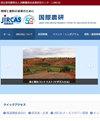日本和国际水稻研究所:对国际水稻研究促进可持续发展的贡献、经验教训和前进方向
IF 0.5
4区 农林科学
Q4 AGRICULTURE, MULTIDISCIPLINARY
引用次数: 0
摘要
本文回顾了日本从1960年开始与国际水稻研究所(IRRI)建立的伙伴关系对水稻研究的贡献。日本科学家被借调到国际水稻研究所总部工作,或被聘为全职工作人员,在育种、病理、生理、农学和社会科学领域进行水稻研究。田中明(Akira Tanaka)博士就是其中之一,他在水稻品种IR8的开发中发挥了关键作用,IR8被认为为第一次绿色革命铺平了道路。为了向农民传播亚洲雨养水稻的农艺研究成果,国际水稻研究所开发了一个基于信息通信技术的决策支持系统(即天气-水稻-营养综合决策支持系统或WeRise),这是一个理想的平台,使农民能够访问来自各个水稻研究领域的数据库。这些基于网络的技术也可以通过移动设备访问。基于网络的技术可以帮助积累大数据,这些数据可用于促进数据驱动的解决方案,并使明智的决策能够帮助稻农适应当前和未来的气候。从各种基于网络的技术中分析大数据仍然是一个可研究的领域,国际水稻研究所和日本可以共同努力,从过去的研究中挖掘有价值的信息,并通过水稻研究进一步促进可持续发展。本文章由计算机程序翻译,如有差异,请以英文原文为准。
Japan and IRRI: Contributions to International Rice Research for Sustainable Development, Lessons Learned and Ways Forward
This paper reviewed the contributions of Japan to rice research through its partnership with the International Rice Research Institute (IRRI), which started in 1960. Japanese scientists were seconded to work at the IRRI headquarters or hired as full-time staff to conduct rice research in the fields of breeding, pathology, physiology, agronomy, and social sciences. Among them is Dr. Akira Tanaka who played a key role in the development of IR8, a rice variety credited for paving the way for the first Green Revolution. To disseminate research outputs from agronomic research on rainfed rice in Asia to farmers, IRRI developed an ICT-based decision support systems (i.e. weather-rice-nutrient integrated decision support system or WeRise) which are ideal platform to enable farmers to access database from various fields of rice research. These web-based technologies are also accessible through mobile devices. Web-based technologies can help accumulate big data that can be used to promote data-driven solutions and enable informed decision-making to help rice farmers adapt to current and future climate. Analysis of big data from various web-based technologies is still a researchable area where IRRI and Japan can work together to exploit valuable information from past researches and further contribute to sustainable development through rice research.
求助全文
通过发布文献求助,成功后即可免费获取论文全文。
去求助
来源期刊
CiteScore
1.00
自引率
25.00%
发文量
42
审稿时长
>36 weeks
期刊介绍:
The Japan Agricultural Research Quarterly (JARQ) is a publication of the Japan International Research Center for Agricultural Sciences (JIRCAS), which provides readers overseas with the latest information on key achievements and developments in agricultural research in Japan, with the expectation that this information would contribute to the agricultural development of countries in tropical and subtropical regions.

 求助内容:
求助内容: 应助结果提醒方式:
应助结果提醒方式:


